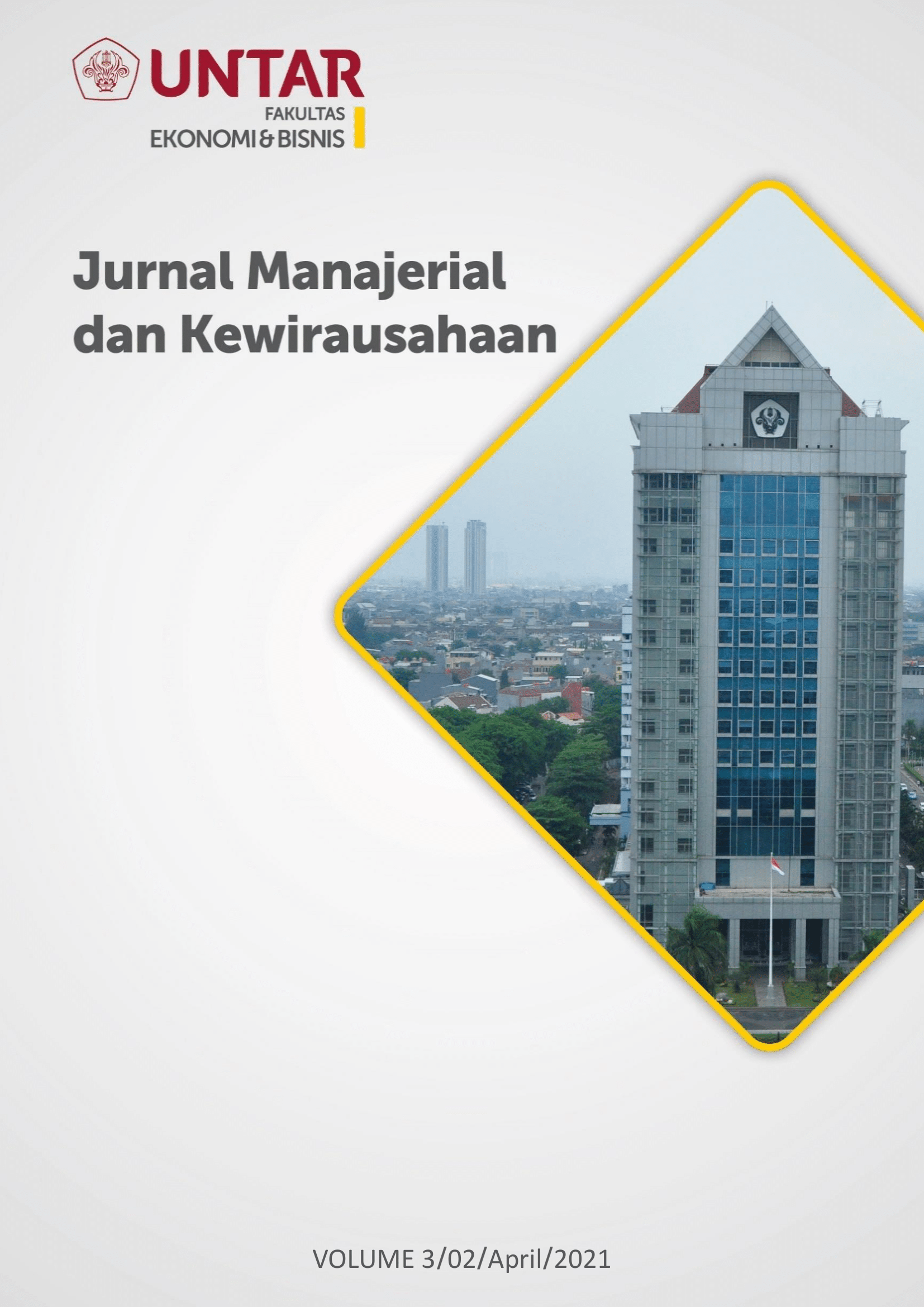Pengaruh Pengetahuan Produk, Keterlibatan Produk, Dan E-Wom Terhadap Niat Pembelian Produk Max Factor Pada Mahasiswi Fakultas Ekonomi Dan Bisnis Universitas Tarumanagara Melalui Website Sociolla Di Jakarta
Main Article Content
Abstract
The purpose of this study is to examine the effect of product knowledge, product involvement, E-WOM on purchase intention of Max Factor products in students of the Faculty of Economics & Business, Tarumanagara University through the Sociolla website in Jakarta. The sampling method in this study was purposive sampling. The sample in this study are 100 respondents who were students of the Faculty of Economics and Business, Tarumanagara University who knew and had never bought Max Factor products on the Sociolla website in Jakarta. Data is being processed using the sofware SmartPLS 3. The results of this study are The results of this study shows that product knowledge has a significant positive effect on purchase intention, product involvement has a significant positive effect on purchase intentions, E-WOM has a significant positive effect on purchase intentions.
Tujuan dari penelitian ini adalah untuk menguji pengaruh pengaruh pengetahuan produk, keterlibatan produk, E-WOM terhadap niat pembelian produk Max Factor pada mahasiswi Fakultas Ekonomi & Bisnis Universitas Tarumanagara Melalui Website Sociolla di Jakarta. Metode pengambilan sampel pada penelitian ini adalah purposive sampling. Sampel dalam penelitian ini berjumlah 100 responden yang merupakan mahasiswi Fakultas Ekonomi dan Bisnis Universitas Tarumanagara yang mengetahui dan belum pernah membeli produk Max Factor pada Website Sociolla di Jakarta. Data diolah dengan menggunakan software SmartPLS 3. Hasil penelitian ini menunjukkan bahwa pengetahuan produk memiliki pengaruh positif signifikan terhadap niat pembelian, keterlibatan produk memiliki pengaruh positif signifikan terhadap niat pembelian, E-WOM memiliki pengaruh positif signifikan terhadap niat pembelian.
Article Details
Section
This work is licensed under a Jurnal Muara Ilmu Ekonomi dan Bisnis Creative Commons Attribution-ShareAlike 4.0 International License.,/p>
References
Ajzen, I. (1991). The theory of planned behavior. Organizational behavior and human decision processes, 50(2), 179-211.
Augusta, E. D., Mardhiyah, D., & Widiastuti, T. (2019). Effect of country of origin image, product knowledge, brand familiarity to purchase intention Korean cosmetics with information seeking as a mediator variable: Indonesian women’s perspective. Dermatology Reports, 11(S1). https://doi.org/10.4081/dr.2019.8014
Beneke, J., de Sousa, S., Mbuyu, M., & Wickham, B. (2016). The effect of negative online customer reviews on brand equity and purchase intention of consumer electronics in South Africa. International Review of Retail, Distribution and Consumer Research, 26(2), 171–201. https://doi.org/10.1080/09593969.2015.1068828
Bian, X., & Moutinho, L. (2011). The role of brand image, product involvement, and knowledge in explaining consumer purchase behaviour of counterfeits: Direct and indirect effects. European Journal of Marketing, 45(1), 191–216. https://doi.org/10.1108/03090561111095658
Elsya, P., & Indriyani, R. (2020). The Impact of Product Knowledge and Product Involvement to Repurchase Intention for Tupperware Products among Housewives in Surabaya, Indonesia. SHS Web of Conferences, 76, 01037. https://doi.org/10.1051/shsconf/20207601037
Fan, Y. W., & Miao, Y. F. (2012). Effect of Electronic Word-of-Mouth on Consumer Purchase Intention: the Perspective of Gender Differences. International Journal of Electronic Business Management, 10(3), 175–181.
Gong, W. (2020). Effects of parasocial interaction, brand credibility and product involvement on celebrity endorsement on microblog. Asia Pacific Journal of Marketing and Logistics. https://doi.org/10.1108/APJML-12-2019-0747
Goyette, I., Ricard, L., & Bergeron, J. (2010). e-WOM Scale: Word-of-Mouth Measurement Scale for e-Services Context. 23, 5–23. https://doi.org/10.1002/dir.10073
Hennig-Thurau, T., Gwinner, K. P., Walsh, G., & Gremler, D. D. (2004). Electronic word-of-mouth via consumer-opinion platforms: What motivates consumers to articulate themselves on the Internet? Journal of Interactive Marketing, 18(1), 38–52. https://doi.org/10.1002/dir.10073
Imran, K., & Tauqir Ahmad, G. (2012). Impact of Brand Related Attributes on Purchase Intention of Customers. Interdisciplinary Journal of Contemporary Research in Business, 4(3), 194–200.
Jalilvand, M. R., & Samiei, N. (2012). The effect of electronic word of mouth on brand image and purchase intention: An empirical study in the automobile industry in Iran. Marketing Intelligence and Planning, 30(4), 460–476. https://doi.org/10.1108/02634501211231946
Lee, W. I., Cheng, S. Y., & Shih, Y. T. (2017). Effects among product attributes, involvement, word-of-mouth, and purchase intention in online shopping. Asia Pacific Management Review, 22(4), 223–229. https://doi.org/10.1016/j.apmrv.2017.07.007
Mayastuti, I. G. A. P. U., Suryani, A. A., & Wardana, I. M. (2014). Peran product involvement dalam memoderasi pengaruh country of origin terhadap purchase intention smartphone merek oppo di kota denpasar. E-Jurnal Manajemen Universitas Udayana, 3(12). https://ocs.unud.ac.id/index.php/Manajemen/article/view/9990
Nurhayati, T., & Hendar, H. (2019). Personal intrinsic religiosity and product knowledge on halal product purchase intention: Role of halal product awareness. Journal of Islamic Marketing, 11(3), 603–620. https://doi.org/10.1108/JIMA-11-2018-0220
Quester, P., & Lin Lim, A. (2003). Product involvement/brand loyalty: Is there a link? Journal of Product & Brand Management, 12(1), 22–38. https://doi.org/10.1108/10610420310463117
Rachmawati, E., Suliyanto, S., & Suroso, A. (2020). A moderating role of halal brand awareness to purchase decision making. Journal of Islamic Marketing. https://doi.org/10.1108/JIMA-05-2020-0145
Ruhamak, M. D., & Rahayu, B. (2017). Pengaruh Word Of Mouth Terhadap Purchase Intention Melalui Brand Image Pada Lembaga Kursus Bahasa Inggris Dynamic English Course Pare. Ekonika: Jurnal Ekonomi Universitas Kadiri, 1(2), 188–204. https://doi.org/10.30737/ekonika.v1i2.14
Saleem, A., & Ellahi, A. (2019). Influence of Electronic Word of Mouth on Purchase Intention of Fashion Products on Social Networking Websites. International Journal of Scientific and Technology Research, 8(10), 1–5.
Shih, K. H., Stresteesang, W., Dao, N. T. B., & Wu, G. L. (2018). Assessing the relationship among online word of mouth, product knowledge and purchase intention in chain restaurant. Journal of Accounting, Finance & Management Strategy, 13(1), 57–76.
Tariq, M. I., Rafay Nawaz, M., Nawaz, M. M., & Butt, H. A. (2013). Customer Perceptions about Branding and Purchase Intention: A Study of FMCG in an Emerging Market. J. Basic. Appl. Sci. Res, 3(2), 340–347.
Yonita, T., & Budiono, H. (2020). Pengaruh Ewom Terhadap Brand Image dan Purchase Intention Produk Innisfree di Jakarta. Jurnal Manajerial dan Kewirausahaan, 2(1), 152-161. https://journal.untar.ac.id/index.php/JMDK/issue/view/324
Yoshihiro, Y., Kuo, H. M., & Shieh, C. J. (2019). The impact of seniors’ health food product knowledge on the perceived value and purchase intention. Revista de Cercetare Si Interventie Sociala, 64, 199–212. https://doi.org/10.33788/rcis.64.16

